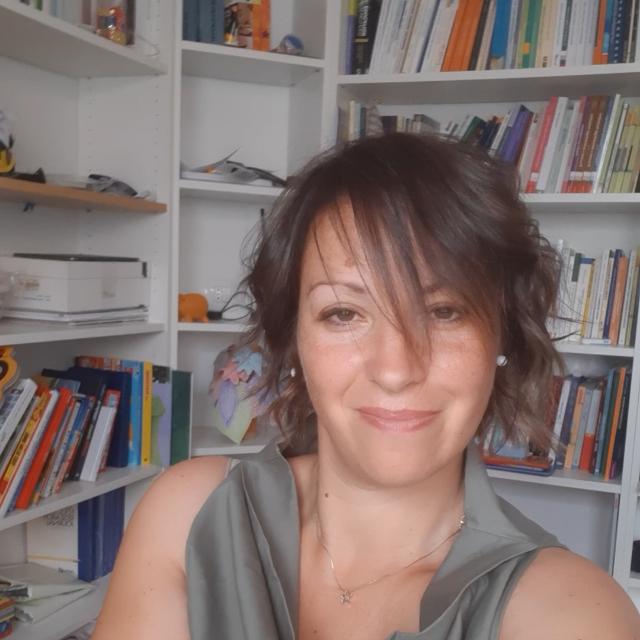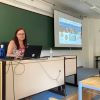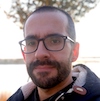Studying at the University of Verona
Here you can find information on the organisational aspects of the Programme, lecture timetables, learning activities and useful contact details for your time at the University, from enrolment to graduation.
Academic calendar
The academic calendar shows the deadlines and scheduled events that are relevant to students, teaching and technical-administrative staff of the University. Public holidays and University closures are also indicated. The academic year normally begins on 1 October each year and ends on 30 September of the following year.
Course calendar
The Academic Calendar sets out the degree programme lecture and exam timetables, as well as the relevant university closure dates..
| Period | From | To |
|---|---|---|
| Sem. 1A | Sep 25, 2023 | Nov 4, 2023 |
| Sem. 1B | Nov 13, 2023 | Dec 22, 2023 |
| Sem. 2A | Feb 19, 2024 | Mar 29, 2024 |
| Sem. 2B | Apr 9, 2024 | May 31, 2024 |
| Session | From | To |
|---|---|---|
| Sessione d'esame invernale | Jan 8, 2024 | Feb 17, 2024 |
| Sessione d'esame estiva | Jun 3, 2024 | Jul 27, 2024 |
| Sessione d'esame autunnale | Aug 26, 2024 | Sep 21, 2024 |
| Sessione d'esame invernale - straordinaria | Jan 7, 2025 | Feb 15, 2025 |
| Session | From | To |
|---|---|---|
| Sessione estiva | Jul 8, 2024 | Jul 13, 2024 |
| Sessione autunnale | Nov 4, 2024 | Nov 9, 2024 |
| Period | From | To |
|---|---|---|
| Festa di Ognissanti | Nov 1, 2023 | Nov 1, 2023 |
| Festa dell'Immacolata | Dec 8, 2023 | Dec 8, 2023 |
| Vacanze di Natale | Dec 23, 2023 | Jan 6, 2024 |
| Vacanze di Pasqua | Mar 30, 2024 | Apr 1, 2024 |
| Festa della Liberazione | Apr 25, 2024 | Apr 25, 2024 |
| Festa del Lavoro | May 1, 2024 | May 1, 2024 |
| Festa del Patrono S. Zeno | May 21, 2024 | May 21, 2024 |
| Festa della Repubblica | Jun 2, 2024 | Jun 2, 2024 |
| Vacanze estive | Aug 12, 2024 | Aug 17, 2024 |
Exam calendar
Exam dates and rounds are managed by the relevant Humanistic Studies Teaching and Student Services Unit.
To view all the exam sessions available, please use the Exam dashboard on ESSE3.
If you forgot your login details or have problems logging in, please contact the relevant IT HelpDesk, or check the login details recovery web page.
Should you have any doubts or questions, please check the Enrollment FAQs
Academic staff
 riccardo.bertolazzi@univr.it
riccardo.bertolazzi@univr.it
 erika.branchini@univr.it; erika.branchini@gmail.com
erika.branchini@univr.it; erika.branchini@gmail.com
 giacomo.mormino@univr.it
giacomo.mormino@univr.it
 alessandra.pantano@univr.it
alessandra.pantano@univr.it
 stefania.pontrandolfo@univr.it
stefania.pontrandolfo@univr.it
Study Plan
The Study Plan includes all modules, teaching and learning activities that each student will need to undertake during their time at the University.
Please select your Study Plan based on your enrollment year.
2° Year It will be activated in the A.Y. 2024/2025
| Modules | Credits | TAF | SSD |
|---|
2 modules among the following| Modules | Credits | TAF | SSD |
|---|
2 modules among the following| Modules | Credits | TAF | SSD |
|---|
3 modules among the following3 modules among the following1 module among the followingLegend | Type of training activity (TTA)
TAF (Type of Educational Activity) All courses and activities are classified into different types of educational activities, indicated by a letter.
Type D and Type F activities
SOFT SKILLS
Find out more about the Soft Skills courses for Univr students provided by the University's Teaching and Learning Centre: https://talc.univr.it/it/competenze-trasversali
CONTAMINATION LAB
The Contamination Lab Verona (CLab Verona) is an experiential course with modules on innovation and enterprise culture that offers the opportunity to work in teams with students from all areas to solve challenges set by companies and organisations.
Upon completion of a CLab, students will be entitled to receive 6 CFU (D- or F-type credits).
Find out more: https://www.univr.it/clabverona
PLEASE NOTE: In order to be admitted to any teaching activities, including those of your choice, you must be enrolled in the academic year in which the activities in question are offered. Students who are about to graduate in the December and April sessions are therefore advised NOT to undertake extracurricular activities in the new academic year in which they are not enrolled, as these graduation sessions are valid for students enrolled in the previous academic year. Therefore, students who undertake an activity in an academic year in which they are not enrolled will not be granted CFU credits.
| years | Modules | TAF | Teacher |
|---|---|---|---|
| 1° 2° | Ciclo tematico di conferenze – sulla "leadership femminile": dati, riflessioni ed esperienze | D |
Paola Dal Toso
(Coordinator)
|
| 1° 2° | Ten years of dreams, lapsus, missed acts". Ten years anniversary of 'TIRESIA', Research Centre for Philosophy and Psychoanalysis | D |
Matteo Bonazzi
(Coordinator)
|
| 1° 2° | Invisible plots in contemporary reality | D |
Rosanna Cima
(Coordinator)
|
| 1° 2° | University and DSA - Methods and strategies for tackling study and university studies | D |
Gianluca Solla
(Coordinator)
|
| years | Modules | TAF | Teacher |
|---|---|---|---|
| 1° 2° | Cities and Freedom | D |
Giacomo Mormino
(Coordinator)
|
| 1° 2° | Ten years of dreams, lapsus, missed acts". Ten years anniversary of 'TIRESIA', Research Centre for Philosophy and Psychoanalysis | D |
Matteo Bonazzi
(Coordinator)
|
| 1° 2° | Education and affectivity - 200 years after Christian education by Antonio Rosmini | D |
Fernando Bellelli
(Coordinator)
|
| 1° 2° | Gnoseology and Metaphysics Workshop | D |
Davide Poggi
(Coordinator)
|
| 1° 2° | IV Reading seminar of classical texts | D |
Alessandro Stavru
(Coordinator)
|
| 1° 2° | IV Reading seminar of classical texts | D |
Alessandro Stavru
(Coordinator)
|
| 1° 2° | IV Reading seminar of classical texts | D |
Alessandro Stavru
(Coordinator)
|
| 1° 2° | Nietzsche, tragedy, the tragic | D |
Alessandro Stavru
(Coordinator)
|
| years | Modules | TAF | Teacher |
|---|---|---|---|
| 1° 2° | Cities and Freedom | D |
Giacomo Mormino
(Coordinator)
|
| 1° 2° | Legal clinics | D |
Alessia Maria Aurora Bevilacqua
(Coordinator)
|
| 1° 2° | Ten years of dreams, lapsus, missed acts". Ten years anniversary of 'TIRESIA', Research Centre for Philosophy and Psychoanalysis | D |
Matteo Bonazzi
(Coordinator)
|
| 1° 2° | Gnoseology and Metaphysics Workshop | D |
Davide Poggi
(Coordinator)
|
| 1° 2° | Philosophy and politics of care | D |
Alessia Maria Aurora Bevilacqua
(Coordinator)
|
| 1° 2° | Tai-Ti aiuto io | D |
Alessandra Cordiano
(Coordinator)
|
| 1° 2° | Verso le elezioni europee 2024 | D |
Massimo Prearo
(Coordinator)
|
| years | Modules | TAF | Teacher |
|---|---|---|---|
| 1° 2° | Narratives. A tool for social workers | D |
Cristina Lonardi
(Coordinator)
|
| 1° 2° | Verona History | D |
Giacomo Mormino
(Coordinator)
|
Phenomenology and ontology of care - TEORIE DELL'ESPERIENZA AFFETTIVA (2023/2024)
Teaching code
4S007330
Teacher
Credits
6
Language
Italian
Scientific Disciplinary Sector (SSD)
M-FIL/01 - THEORETICAL PHILOSOPHY
Period
Sem. 1A dal Sep 25, 2023 al Nov 4, 2023.
Courses Single
Authorized
To show the organization of the course that includes this module, follow this link: Course organization
Program
This year’s course is dedicated to the philosophical assumptions of psychopathology. To address this issue, we will consider a phenomenology of corporeality and feeling, and on this basis, we will address the problem of disorders of the ordo amoris, which is the organ that enactively produces our existential form. The main reference author is the German phenomenologist Max Scheler (1874-1928).
The following is the indicative and tentative schedule of lectures. Each lesson will explore a particular concept:
Lecture 1 Presentation of the syllabus and examination mode. Assumptions of the philosophical approach. Concept of the day: Metabolism and emergentism.
Lecture 2 Beyond reductionism. The concept of organism as a schema of freedom in Schelling. Concept of the Day: Intentionality and phenomenology.
Lecture 3 At the origins of the phenomenology of corporeality: the Leib and Körper distinction in Husserl and Scheler. Concept of the day: Scheler’s phenomenology.
Lecture 4 The two phases of the theory of corporeality in Scheler. Concept of the day: body schema.
Lecture 5 Body and environment: Uexküll and the ecological theory of perception. Concept of the day: biosemiotics.
Lecture 6 The origins of enactivism: the theory of embodied phantasy in Scheler. Concept of the day: enactivism.
Lecture 7 What is a hallucination and why is this issue important for a theory of perception? The relationship between phantasy and sensation in Aristotle. Concept of the day: solitary confinement.
Lecture 8 What is feeling? The connection between feeling, life, and the expressive plane. Concept of the day: expressiveness.
Lecture 9 What are emotions for? Ordo carnis, ordo socialis, and ordo amoris. Concept of the day: ordo amoris.
Lecture 10 Psychopathology as a disturbance of the feeling of the personal center. Concept of the day: personal singularity. Concept of the day: Scheler and the origin of psychopathology.
Lecture 11 Psychopathology and ordo amoris as the enactive center of existential form. Concept of the day: anthropogenesis.
Lecture 12 Three specific cases: the modus vivendi of individuals with obsessive-compulsive disorder, melancholia, and schizophrenia.
Two texts are to be brought to the examination. One chosen from the following group:
- 1) W. Blankenburg, La perdita dell'evidenza naturale, Raffaello Cortina 1998.
-2) G. Cusinato, Biosemiotica e psicopatologia dell'ordo amoris. In dialogo con Max Scheler, FrancoAngeli 2018.
- 3) E. Minkowsky, La schizofrenia, Einaudi 1997.
- 4) F. Toccafondi, Max Scheler, Mimesis 2023.
Also one of these three:
- A. Kolany, Il disgusto, Marinotti 2017.
- J. von Uexküll, Ambienti animali e ambienti umani, Quodlibet 2013.
- Marguerite A. Sechehaye, Diario di una schizofrenica, Giunti Editore 2006.
For non-attending students, listening to video recordings is compulsory.
Bibliography
Didactic methods
Only part of the lectures will be video-recorded and made available on Moodle. However, an organic and coherent series of recordings will be devised, also incorporating material from other lectures and conferences, in order to provide non-attending students with an adequate introduction to the course. Knowledge of the topics covered in the lecture is an integral part of the syllabus to be brought to the examination also for non-attending students.
Learning assessment procedures
The assessment of learning outcomes requires to pass an oral examination. The subject of the examination will be the texts chosen from those in the syllabus and the topics addressed in the lecture. Non-attending students will refer to the video recordings.
A written paper, intended as a writing exercise, can also be brought to the oral examination. The paper will be counted with a mark from 0 to 2, which will be added to the mark for the oral examination. The paper, of approximately 20,000 characters (3000 words/10 pages), must be submitted by e-mail at least five days before the discussion. In Word, the file must be labelled with your SURNAME, NAME, and TEACHING TITLE. The paper should be considered a reasoned list of the parts of the texts in the programme that have touched you most or that have otherwise aroused your interest. The latter should be placed in inverted commas indicating the page number to avoid confusion between one's comments and the quotations. The paper's final part should be devoted to a short chapter of 'Personal Reflection' of a couple of pages in which you can refer to your own experience or other texts. It is advisable to send the teacher an initial version of the paper for initial feedback.
Evaluation criteria
In the evaluation of the exam, the following will be considered in particular: 1) possession of a thorough knowledge of the main themes of the program texts elaborated during the course (points 12/30); 2) the ability to argue and develop an autonomous and original reflection about the theoretical implications of these themes (points 12/30; 3) competence in the specialized vocabulary (points 6/30).
Exam language
Italiano
Sustainable Development Goals - SDGs
This initiative contributes to the achievement of the Sustainable Development Goals of the UN Agenda 2030. More information on sustainability
Career prospects
Module/Programme news
News for students
There you will find information, resources and services useful during your time at the University (Student’s exam record, your study plan on ESSE3, Distance Learning courses, university email account, office forms, administrative procedures, etc.). You can log into MyUnivr with your GIA login details: only in this way will you be able to receive notification of all the notices from your teachers and your secretariat via email and soon also via the Univr app.
Competenze linguistiche
I crediti formativi universitari relativi alle "Ulteriori competenze linguistiche" (B1 informatizzato se seconda lingua; livello B2 completo se stessa lingua della triennale) possono essere acquisiti in una delle due seguenti modalità:
- iscrizione da parte della/o studente presso il Centro Linguistico di Ateneo (CLA ➔ https://cla.univr.it/it/test-e-certificazioni) per il sostenimento e il superamento delle prove + iscrizione, sempre da parte della/o studente, in apposita lista per la registrazione crediti e registrazione CFU (senza presenza) da parte dell’Università.
Oppure
- equipollenza di certificazioni linguistiche esterne: riconoscimento equipollenza di certificazioni linguistiche esterne (➔ https://cla.univr.it/it/servizi/riconoscimento-delle-certificazioni-linguistiche-esterne).
Gestione carriere
Linguistic training CLA
Internships
Graduation
Documents
| Title | Info File |
|---|---|
|
|
pdf, it, 101 KB, 10/04/24 |
|
|
pdf, it, 112 KB, 14/05/24 |
List of thesis proposals
| theses proposals | Research area |
|---|---|
| Linguaggio e mito in Tolkien | ENGLISH LITERATURE - Critical Theory & Poetics |
| Dialettica del negativo in Meister Eckhart | HISTORY OF PHILOSOPHY - MIDDLE AGES |
| La felicità nel Medioevo | HISTORY OF PHILOSOPHY - MIDDLE AGES |
| Le figure di Eva e Maria in Ildegarda di Bingen | HISTORY OF PHILOSOPHY - MIDDLE AGES |
| IA. Una critica fenomenologica al concetto di Intelligenza Artificiale | The Human Mind and Its Complexity: Cognitive science, psychology, linguistics, philosophy of mind - Philosophy of science, epistemology and logic |
Practical information for students
Documents
| Title | Info File |
|---|---|
|
|
pdf, it, 325 KB, 02/05/23 |
|
|
pdf, it, 212 KB, 02/05/23 |
|
|
pdf, it, 131 KB, 02/05/23 |

 +39 045 802 8459
+39 045 802 8459


























